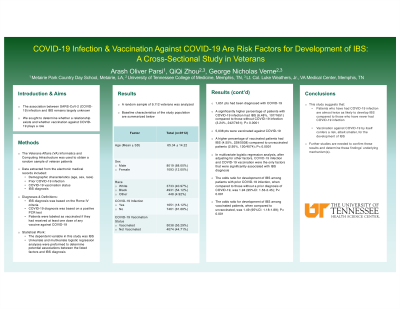Tuesday Poster Session
Category: Functional Bowel Disease
P3373 - COVID-19 Infection and Vaccination Against COVID-19 Are Risk Factors for Development of Irritable Bowel Syndrome: A Cross-Sectional Study in Veterans
Tuesday, October 24, 2023
10:30 AM - 4:00 PM PT
Location: Exhibit Hall

Has Audio
- AP
Arash Oliver Parsi
Metairie Park Country Day School
New Orleans, LA
Presenting Author(s)
Arash Oliver. Parsi, 1, Qiqi Zhou, MD, PhD2, George Nicholas. Verne, MD2
1Metairie Park Country Day School, New Orleans, LA; 2University of Tennessee Health Science Center, Memphis, TN
Introduction: The association between SARS-CoV-2 (COVID-19) infection and IBS remains largely unknown. We sought to determine whether a relationship exists and whether vaccination against COVID-19 plays a role.
Methods: The Veterans Affairs (VA) Informatics and Computing Infrastructure was used to obtain a random sample of veteran patients. Demographic characteristics of patients (age, sex, race), prior COVID-19 infection, COVID-19 vaccination status, and IBS diagnosis were extracted from the electronic medical records. The diagnosis of IBS was based on the Rome IV criteria. COVID-19 diagnosis was based on a positive PCR test result. Patients were labeled as vaccinated if they had received at least one dose of any vaccine against COVID-19. The dependent variable in this study was IBS. Univariate and multivariate logistic regression analyses were preformed to determine potential associations between the listed factors and IBS diagnosis.
Results: A random sample of 9,112 veterans was analyzed. Baseline characteristics of the study population are summarized in Table 1. Overall, 1,651 patients had been diagnosed with COVID-19 infection. A significantly higher percentage of patients with COVID-19 infection had IBS (6.48%, 107/1651) compared to those without COVID-19 infection (3.24%, 242/7461); P< 0.0001. A total of 5,038 patients were vaccinated against COVID-19. A significantly higher percentage of vaccinated patients had IBS (4.55%, 229/5038) compared to unvaccinated patients (2.95%, 120/4074); P< 0.0001. In multivariate logistic regression analysis, after adjusting for other factors, COVID-19 infection and COVID-19 vaccination were the only factors that were significantly associated with IBS diagnosis. The odds ratio for the development of IBS among patients with COVID-19 infection, when compared to those without a diagnosis of COVID-19, was 1.94 (95%CI: 1.53-2.45); P< 0.001. The odds ratio for development of IBS among vaccinated patients, when compared to unvaccinated, was 1.49 (95%CI: 1.18-1.89); P< 0.001.
Discussion: This study suggests that patients who have had COVID-19 infection are twice as likely to develop IBS compared to those who have never had COVID-19 infection. It also suggests that vaccination against COVID-19 by itself confers a risk, albeit smaller, for the development of IBS. Further studies are needed to confirm these results and determine the underlying mechanism(s) for these findings.
Disclosures:
Arash Oliver. Parsi, 1, Qiqi Zhou, MD, PhD2, George Nicholas. Verne, MD2. P3373 - COVID-19 Infection and Vaccination Against COVID-19 Are Risk Factors for Development of Irritable Bowel Syndrome: A Cross-Sectional Study in Veterans, ACG 2023 Annual Scientific Meeting Abstracts. Vancouver, BC, Canada: American College of Gastroenterology.
1Metairie Park Country Day School, New Orleans, LA; 2University of Tennessee Health Science Center, Memphis, TN
Introduction: The association between SARS-CoV-2 (COVID-19) infection and IBS remains largely unknown. We sought to determine whether a relationship exists and whether vaccination against COVID-19 plays a role.
Methods: The Veterans Affairs (VA) Informatics and Computing Infrastructure was used to obtain a random sample of veteran patients. Demographic characteristics of patients (age, sex, race), prior COVID-19 infection, COVID-19 vaccination status, and IBS diagnosis were extracted from the electronic medical records. The diagnosis of IBS was based on the Rome IV criteria. COVID-19 diagnosis was based on a positive PCR test result. Patients were labeled as vaccinated if they had received at least one dose of any vaccine against COVID-19. The dependent variable in this study was IBS. Univariate and multivariate logistic regression analyses were preformed to determine potential associations between the listed factors and IBS diagnosis.
Results: A random sample of 9,112 veterans was analyzed. Baseline characteristics of the study population are summarized in Table 1. Overall, 1,651 patients had been diagnosed with COVID-19 infection. A significantly higher percentage of patients with COVID-19 infection had IBS (6.48%, 107/1651) compared to those without COVID-19 infection (3.24%, 242/7461); P< 0.0001. A total of 5,038 patients were vaccinated against COVID-19. A significantly higher percentage of vaccinated patients had IBS (4.55%, 229/5038) compared to unvaccinated patients (2.95%, 120/4074); P< 0.0001. In multivariate logistic regression analysis, after adjusting for other factors, COVID-19 infection and COVID-19 vaccination were the only factors that were significantly associated with IBS diagnosis. The odds ratio for the development of IBS among patients with COVID-19 infection, when compared to those without a diagnosis of COVID-19, was 1.94 (95%CI: 1.53-2.45); P< 0.001. The odds ratio for development of IBS among vaccinated patients, when compared to unvaccinated, was 1.49 (95%CI: 1.18-1.89); P< 0.001.
Discussion: This study suggests that patients who have had COVID-19 infection are twice as likely to develop IBS compared to those who have never had COVID-19 infection. It also suggests that vaccination against COVID-19 by itself confers a risk, albeit smaller, for the development of IBS. Further studies are needed to confirm these results and determine the underlying mechanism(s) for these findings.
Disclosures:
Arash Parsi indicated no relevant financial relationships.
Qiqi Zhou indicated no relevant financial relationships.
George Verne indicated no relevant financial relationships.
Arash Oliver. Parsi, 1, Qiqi Zhou, MD, PhD2, George Nicholas. Verne, MD2. P3373 - COVID-19 Infection and Vaccination Against COVID-19 Are Risk Factors for Development of Irritable Bowel Syndrome: A Cross-Sectional Study in Veterans, ACG 2023 Annual Scientific Meeting Abstracts. Vancouver, BC, Canada: American College of Gastroenterology.
